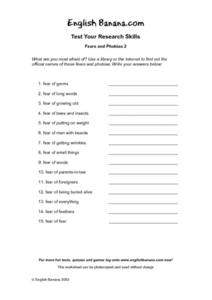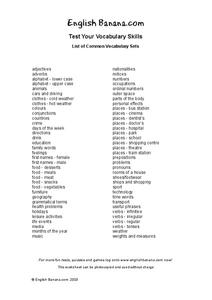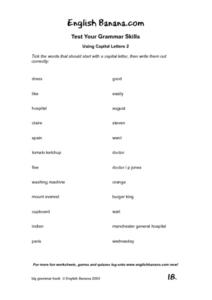Curated OER
Test Your Reading Skills-- Homophones 5
In this language arts instructional activity, students investigate homophones, or words that sound the same but are spelled differently. Students read each word and write a homophone in the blank next to it.
Curated OER
Advanced Homophones 4
In this language arts worksheet, students discover homophones, or words that sound alike but are spelled differently. Students read 15 words and write the homonym on the line.
Curated OER
Test Your Lateral Thinking! Word Puzzles 1
In this language arts instructional activity, learners examine 10 word puzzles. Students work out the clues to reveal some well known words and phrases. Example: GSGE (scrambled eggs)
Curated OER
Fears And Phobias 2
In this language arts worksheet, students demonstrate Internet or library research skills by finding out the names of 15 phobias. Example: fear of men with beards (pogonophobia).
Curated OER
Elementary Homophones 3
In this language arts learning exercise, students examine 15 words in a word bank. Students write a word that is a homophone, or word that sounds the same but is spelled differently.
Curated OER
Positive And Negative Words 2
In this language arts worksheet, learners investigate if words have positive or negative connotations. Students analyze a list of 20 words and mark them with a P or N according to whether they are positive or negative.
Curated OER
Nouns and Verbs
In this language arts learning exercise, students discover that some words can be used as both nouns and verbs. Students look at 10 words and write sentences using them as both nouns and verbs. Example: smell
Curated OER
Punctuation Marks 2- Test Your Spelling Skills
In this language arts worksheet, students solve anagram puzzles to determine the names of punctuation marks that are shown a the top of the page. They write the names on 10 blank lines at the bottom half of the page.
Curated OER
Complete the Sentences 2
In this language arts activity, students read 10 incomplete sentences and choose the most concise appropriate word or phrase to make the sentence coherent.
Curated OER
Adjectives- Group 1-- Comparative And Superlative Forms --Tough Version
For this language arts worksheet, students analyze 40 adjectives and generate the comparative and superlative forms to fill out this chart. Example: rough (rougher, roughest)
Curated OER
Hotel Anagrams
In this language arts and social studies activity, students examine 30 scrambled words and phrases all pertaining to staying in a hotel. Students unscramble the words in this challenging puzzle. Example: heskupenieog (housekeeping)
Curated OER
Hurling
In this language arts worksheet, students listen to a podcast of an article about Hurling. The transcript of the podcast is included as an option. Students label 7 sentences as true or false. They answer 7 comprehension questions and...
Curated OER
"Wh--" Questions
In this language arts worksheet, students learn the proper use of the question words: what, where, when, who and why. Students read the clues, then complete each sentence, beginning each on with the correct question word.
Curated OER
Finish the Sentences 2
In this language arts worksheet, students read the beginning of 15 sentences and give an appropriate ending either in writing or orally. Example: The problem is that _____.
Curated OER
Good Advice 3
In this language arts worksheet, students match 20 questions with their logical "good advice" answers. Example: Do you always wake up late? (Buy an alarm clock!)
Curated OER
Comparatives and Superlatives 4
In this language arts worksheet, students learn the comparative and superlative forms of 10 adjectives. Students write the appropriate form of the adjectives, spelling them correctly on the lines. Example: dirty (dirtier, dirtiest).
Curated OER
List of Common Vocabulary Sets
In this language arts worksheet, students examine lists of common vocabulary sets. There are now directions given with this worksheet which can be used as teacher reference.
Curated OER
Question Forms Using Verb "to do" as an Auxiliary Verb (Present Simple Tense) 3
In this language arts learning exercise, students analyze 10 sentences which have the words in scrambled order. Students rearrange the words to make a question using the verb "to do." Example: you do OK feel (Do you feel OK?)
Curated OER
Question Forms Using Verb "to do" as an Auxiliary Verb (Present Simple Tense) 1
In this language arts activity, learners examine 10 sentences which are scrambled. Students rearrange the words to make each question correct, using the verb form of "to do." Example: do you how do (How do you do?)
Curated OER
Question Forms Using Verb "to have" as an Auxiliary Verb (Present Perfect Tense) 2
In this language arts worksheet, students examine 10 scrambled sentences. Students rearrange the words to make a questions using verb "to have" as an auxiliary verb in the present perfect tense. Example: you her have before been (Have...
Curated OER
Question Forms Using Verb "to have" as an Auxiliary Verb (Present Perfect Tense) 3
For this language arts worksheet, learners examine 10 sentences which are scrambled. Students rearrange the words in each sentence to make a question using verb "to have" as an auxiliary verb in the present perfect tense. Example: when...
Curated OER
Using Capital Letters 2
In this language arts worksheet, students examine a list of 30 mixed common and proper nouns. Students indicate which words should be capitalized and write them out correctly.
Curated OER
Using Capital Letters 1
In this language arts worksheet, learners analyze a list of 30 mixed common and proper nouns. Students mark which words should start with a capital letter and write them out correctly.
Curated OER
My Pocket IT Glossary-- A-Z of Computer Words (Nouns)
In this language arts worksheet, students learn the meanings of 12 computer technology vocabulary words. Students examine 12 small boxes with one word in each. There are no directions but students could write definitions or sentences.

























